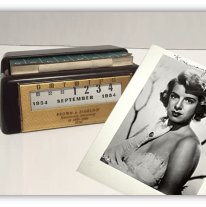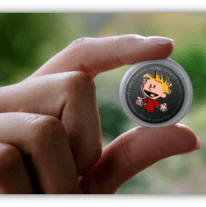The band had kind of broken up. They were young and impetuous.
And they were always breaking up.

No one remembers why the singer, Feargal Sharkey, quit this particular time, but he had to be convinced to come back long enough to record a four song EP.
This record was either going to get the band signed to a label, or it was just going “to prove there was a punk band that existed in Derry” – and be the band’s epitaph.
It got them signed. And became the epitaph for someone else entirely.
Punk was big in London, but not so much in the west of Northern Ireland.
The Undertones were the only punk band in the area, and they weren’t making any headway. They had a handful of fans, but few places to play.

Sometimes they’d travel to Belfast for a gig.
Most people of greater Derry disliked them because the newspapers said that punks were bad people. There was little sense in making a record, but they did.
Good Vibrations was both a Belfast record store and label run by Terri Hooley.

He made it his mission to bring Irish punk to the rest of the UK.
He was initially reluctant to sign The Undertones. “I wasn’t sure about them because nobody liked them. People crossed the road just to spit at Feargal Sharkey.” Still, he not only released The Undertones’ EP, he personally took it to London to shop to bigger labels.
He got no money for doing so. That’s how much he believed in his mission.
No label liked it, not even Stiff Records. Stiff’s standard rejection form letter is sarcastic yet supportive.

They included it when returning demo tapes they weren’t interested in. It reads as follows:
Dear Hopeful,
As must be pretty obvious by now, we haven’t even got the decency to write a personal letter to you (but at least we’ve sent one).
If we’ve had it too long, we apologise; if it’s not the right one, don’t worry – it’s probably better than the original one you sent in; and if there is no tape with this letter, then we’ve either lost it, or are considering taking it further and putting it out as a hit under another name.
Thanks for sending it in anyway and don’t give up, even though the best record company has in fact turned you down.
This is an official rejection letter.
Yours, Eamon Bytback
Then, rubber stamped in red ink:

SORRY
IN THE DUMPER
Despite the lack of label interest, Hooley got the EP into the hands of influential BBC Radio DJ John Peel.
His real name was John Ravenscroft, which is a perfectly fine name. But his early career was on Radio London:

The illegal pirate radio station broadcasting from a ship offshore.
None of its DJs used their real names. He became known by the pseudonym and kept it when he moved to the BBC.
Peel fell in love with the first track on The Undertones’ EP.

He played it and then asked his audience, “Wasn’t that the most wonderful record you’ve heard in your life?”
And he immediately played it a second time. It’s the only song he ever played twice in a row, and then he played it many more times over the years.
It was his favorite song for the rest of his life, and would sometimes bring him to tears.
He always followed it with another song, so he wouldn’t have to speak with a quavering voice as “Teenage Kicks” finished.
Record labels reconsidered signing The Undertones after hearing Peel’s enthusiasm. They began calling the home of brother guitarists, John and Damian O’Neill, because they were the only ones in the band whose family had a phone.
Sire Records was among the interested labels, and they sent a representative to Derry to see The Undertones perform. The rep wanted to sign them and brought Sharkey and bassist Michael Bradley to London to negotiate a deal. The wining and dining commenced, but leaving the remaining band members back in Derry turned out to be a great negotiating technique.
Ever have a car salesman tell you, “I need to talk to my manager” and leave the room?

They do that to give themselves time to think and to make you anxious.
It was the same thing here, because Sharkey and Bradley wouldn’t agree to anything without running it by the boys back home. Sire offered £8,000. Someone back in Derry told Sharkey and Bradley to counter with £60,000. It was a ridiculous number, but they got the number up to £10,000.

And “Teenage Kicks” was re-released on Sire two weeks later.
The single rose to #31 on the UK Singles chart. They would release five albums and thirteen singles before breaking up for good in 1983. Eleven of those singles hit the chart. Reissues of Teenage Kicks got to #60 later in 1983 and #91 in 1994. The O’Neill brothers formed another successful band called That Petrol Emotion.
Terri Hooley freely relinquished any rights to the early Undertones recordings when they signed to Sire.
He didn’t want money, he was happy just to see them succeed. Over the years, Good Vibrations closed several times due to Hooley’s poor financial decisions. He would always reopen it within a year, but he closed the shop for the last time in 2015 due to his poor health.

He has dialysis treatments three times a week but he’s still with us and does DJ-ing gigs from time to time.
John Peel loved “Teenage Kicks” so much, he asked that its first line be engraved on his tombstone.

You can read it if you go to the graveyard of St Andrew’s Church in Great Finborough, Suffolk.
A quick observation, and perhaps I’m reading too much into it, but the tombstone misquotes the song. The original lyric asks:
“Are teenage dreams so hard to beat?” Peel’s tombstone states instead:
“Teenage dreams so hard to beat.”
The Undertones asked a question at the beginning of their lives.
Peel answered it at the end of his.

Let the author know that you liked their article with a “Green Thumb” Upvote!





Update: Derry, the town that spit and threw eggs at The Undertones, has now honored them with a mural.
https://www.belfasttelegraph.co.uk/news/northern-ireland/feargal-sharkey-reacts-to-new-mural-of-the-undertones-in-derry/a1175515582.html
Whenever someone is trying to do something different, very few are on their side, because it’s easy to side with the overwhelming odds against them, but boy will they jump to claim them as their own after the fact. Sad but predictable.
I was wondering what music should accompany me at work today and this gave me the answer. Excellent timing. The one thing people are likely to know about them is Teenage Kicks and the John Peel connection but they tend to be overlooked when considering the history of punk despite being one of the more commercially succesful bands to come out of it. Nice to see them getting their dues here.
Teenage Kicks is a perfect record though I prefer My Perfect Cousin with its sense of humour;
“His mother bought him a synthesiser
Got the Human League in to advise her”
Terri Hooley is one of the greats as well. Someone who has made a difference to a lot of people in a small understated way. What he lacked in business acumen he made up for in passion and inspiring others. There’s a film, also called Good Vibrations, about his adventures in punk. It features The Undertones and a couple of other notable Northern Irish punk bands; The Outcasts and Rudi. Well worth watching.
Feargal Sharkey had a briefly succesful solo career, UK #1 single in 1985 with A Good Heart which is far from The Undertones sound. He’s gone onto important work outside music. While the rest of the band reformed with a new singer, Feargal is now a prominent environmental campaigner with a focus on holding British water companies to account and cleaning up our lakes and rivers. Like Terri, a great guy leaving an important legacy.
I haven’t seen Good Vibrations but I know about it and based on your recommendation will find it.
I had to look up the “A Good Heart” video but I remembered it a few seconds in. Looks like Sharkey is better known in the UK than here, as I’ve heard his name associated with activism but don’t know anything beyond that. Guess I’ve got some research to do….
Very cool story about these guys. “Teenage Kicks” is like an anomaly to me. It’s loud enough to be punk, enough so that when I was listening to it next to my sleeping cat, she woke up and left. But it has a vulnerability, both vocally and lyrically, that one doesn’t hear too often in punk. I get the appeal.
That kind of juxtaposition always gets my attention, like “Romeo” by The Wipers could be rockabilly but the dark vocals change the vibe entirely.
Is that rubber stamp AI-generated? The text on it is rather suspicious-looking.